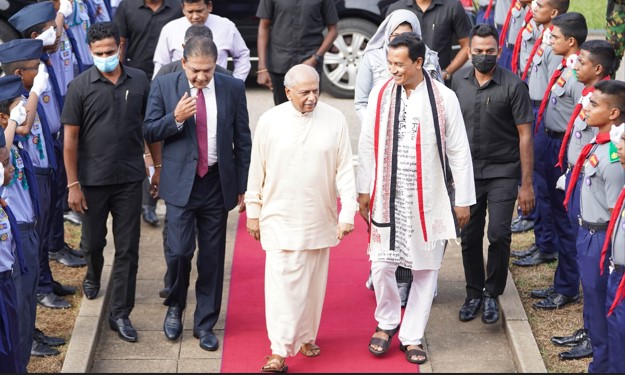By P.K.Balachandran
Colombo, February 21: Bangladesh High Commission in Colombo observed the International Mother Language Day – 2023 this morning at the historic Independence Square with the gracious presence of Prime Minister of Sri Lanka Dinesh Gunawardena
Other dignitaries present were the State Minister of Higher Education Dr Suren Rāghavan, State Minister of Foreign Affairs Tharaka Balasuriya and Heads of Diplomatic Missions and UN and International Organizations. People from all walks of life including academia, intellectuals, political and cultural personalities, high government officials as well as hundreds of students and scouts from schools across the island also joined the observance. On this occasion, Independence Square turned into a grand assembly of different language speakers.
The Prime Minister and other dignitaries scribbled in their respective mother tongues their feelings about the Day on canvas with strokes of brush and paint.
The program began with the choral rendition of the immortal Ekushey song by the children of the High Commission officials and their family members. The entire hall stood in solemn silence for one minute as a mark of respect to the Language Martyrs.
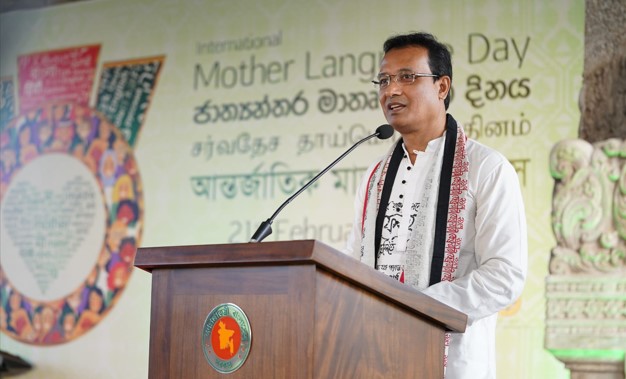
To mark the day, under the patronage of the High Commission and with the assistance of Sri Lanka’s Ministry of Education, an island-wide creative writing and painting competition for children was launched two months back on the theme “Mother Language: Unity in Diversity”. In today’s event, the winners of the competition were awarded
The entertainment program began with a choral group from the Swami Vivekananda (Indian) Cultural Center perfectly rendering Rabindranath Tagore’s song Eso Shyaamolo Sundaro in praise of nature. This was followed by Humko Man ki Shakti Dena a prayer set to tune by Vasant Desai and sung by the late Vani Jayaram in the iconic 1971 Hindi film Guddi starring Jaya Bhaduri and Dharmendra.
Next was a rendering of a Lata Walpola prayer song in Sinhala by Nirmali and Maliniti. A little Russian boy then sang a song in his language on hopes for a bright future. The lad’s voice had an amazing range and the rendering was flawless. A Sinhalese girl Akarsha Mallwarachchi recited a Russian poem by Yevgeny Yevtushenko with feeling.
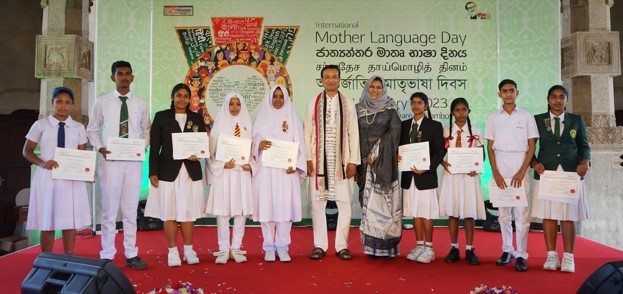
Vaishali Yogarajan tunefully sang the famous Subramanya Bharathi song Aaduvomey Pallu Paaduvomey celebrating freedom and unity. A troupe of kids from the Maldivian Educational and Cultural Centre in Colombo performed a dance portraying the life of fishermen and recited poems in the Maldivian language Dhihevi. A Persian poem on a mother’s love for her child was recited by an Iranian girl Mobina. The fitting finale was a K-pop performance by the Sri Lankan group Island Stoppers.
Prior to the entertainment programs, the Minister for Higher Education Dr.Suren Raghavan gave away prizes to the winners of essay and poetry competitions among school kids from the Sinhala and Tamil streams on the theme: mother language and unity. The competition, which drew entries from all parts of the island, was held by the Ministry of Education.
In his speech, Dr.Raghavan said that there are at present 6,500 living languages in the world, out of which, more than 2000 are in South Asia. These languages will have to be preserved. Linguistic diversity has to be encouraged. But diversity necessitates unity. He pointed out how, in Sri Lanka, non-recognition of linguistic diversity led to problems of national unity. He appealed for learning from such experiences. Dr.Raghavan spoke in three Sri Lankan languages, Tamil, Sinhala and English.
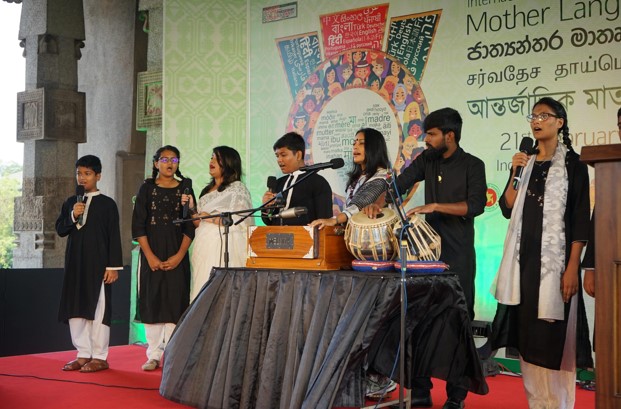
The UN Resident Coordinator in Sri Lanka, Sarath Das, recalled the role played by the students of Bangladesh in getting their language, Bangla, its rightful place and how their movement led to the establishment of Bangladesh, the only nation-state in the world which came into being as a result of a language rights struggle.
The mother language is the heart of our existence, Das said. It encapsulates several things, including a nation’s history and culture. He regretted that 40% of the world’s 6, 700 are on the verge of extinction. By promoting language diversity, a nation would develop mutual understanding, he added.
In his welcome remarks, High Commissioner of Bangladesh Tareq Md Ariful Islam reflected on the significance of the day, shared its historical perspective and emphasized the role of mother tongues in promoting an inclusive society and a peaceful world. Tareq Ariful Islam said recognition of language diversity and its promotion ensure social harmony. He further said that, given the fact that one language disappears every two weeks, efforts are now being made to preserve languages and their scripts. Scripts are being preserved digitally for posterity and these are available on Google, he added.
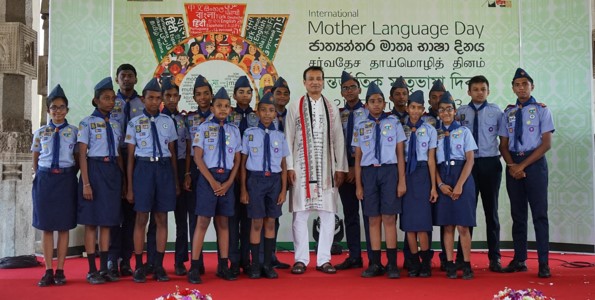
The High Commissioner said that International Mother Language Day has its origin in the struggle for the rights of the Bangla language. The date for Mother Language Day – February 21 – was the day on which students engaged in the cause of the Mother Language in 1952 were martyred.
The students of the University of Dhaka, with the support of the general public, arranged massive rallies and meetings. On 21 February 1952, police opened fire on the demonstrators. Abdus Salam, Abul Barkat, Rafiq Uddin Ahmed, Abdul Jabbar and Shafiur Rahman were killed and hundreds of others were injured.
The fight for the inalienable right to their mother language led to the recognition of February 21 as International Mother Language Day, first by UNESCO in 1999 at Bangladesh’s initiative. Subsequently, in 2007, the UN General Assembly endorsed it by a resolution.
A blood-donation camp was also arranged by the High Commission in association with Sri Lanka Scout Association at the General Sir John Kotelawala Defence University Hospital.
The day’s in-house observance began at the Chancery early morning with ceremonial hoisting of the national flag at half-mast followed by one-minute silence, special prayers and reading out messages of high dignitaries of Bangladesh.
END





















































